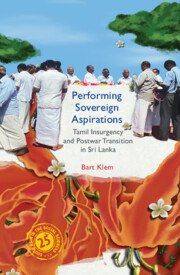Book contents
- Frontmatter
- Dedication
- Contents
- List of Illustrations
- Acknowledgements
- A Typographical Note on Separatism
- List of Abbreviations
- 1 Introduction
- 2 Sovereignty, Performativity and Tamil Nationalism in Sri Lanka
- 3 Performing an Insurgent Sovereign Experiment
- 4 Reconstituting ‘Pure Tamil Space’ after Sovereign Erasure
- 5 The Bureaucratic Evolution of Devolution
- 6 Tamil Nationalist Anti-politics in the Wake of Defeat
- 7 Conclusion
- Epilogue
- Glossary
- References
- Index
6 - Tamil Nationalist Anti-politics in the Wake of Defeat
Published online by Cambridge University Press: 30 April 2024
- Frontmatter
- Dedication
- Contents
- List of Illustrations
- Acknowledgements
- A Typographical Note on Separatism
- List of Abbreviations
- 1 Introduction
- 2 Sovereignty, Performativity and Tamil Nationalism in Sri Lanka
- 3 Performing an Insurgent Sovereign Experiment
- 4 Reconstituting ‘Pure Tamil Space’ after Sovereign Erasure
- 5 The Bureaucratic Evolution of Devolution
- 6 Tamil Nationalist Anti-politics in the Wake of Defeat
- 7 Conclusion
- Epilogue
- Glossary
- References
- Index
Summary
The old guard of Tamil nationalist politicians moved back to centre stage after the Liberation Tigers of Tamil Eelam's (LTTE) defeat. The gentlemen lawyers and parliamentarians of the main Tamil party, Ilankai Tamil Arasu Kadchi (ITAK), had made way for armed youth militants in the 1970s, when Tamil nationalism became Tamil national liberation. Pleas for federal power-sharing then escalated into uncompromising separatism, and constitutional bargaining yielded to guerrilla violence. In 2009, the pendulum swung back. The now-ageing ITAK leaders moved to the front seat again. But what could they bargain for without leverage? How could they claim heirship of the national cause when the new political reality forced them to shed the aspiration of an independent Eelam? ITAK was thus confronted with one of the central conundrums of this book: the schizophrenic plight of separatist political parties, which are forced to pursue their aspirations through the very democratic landscape that they reject on principle. To understand ITAK's postwar positioning, we also need to reengage with the provincial council system discussed in Chapter 5. The Tamil nationalist movement saw the provincial councils as treason to the Tamil cause. But after the defeat of the LTTE, they were the only remaining forum for a semblance of self-government in the north and east of Sri Lanka. If ITAK refused to govern the Northern and Eastern Province, rival Tamil parties would do it in their place.
A performative conception of politics sheds light on the way ITAK handled the schizophrenic condition of simultaneously opposing and participating in the prevalent political framework. By lifting our preoccupation with formal institutions and associated moral yardsticks of democratic behaviour, this conceptualisation directs our focus to the repertoires with which political aspirations are enacted, within or beyond official mandates and procedures. More specifically, I will draw on the performative repertoire that Hansen (1999) has called ‘anti-politics’ in his work on Hindu nationalism. Anti-politics may be defined as a principled dissociation from the prevalent political arena. Evidently, the very attempt of extracting oneself from politics is itself a political act. Anti-politics should therefore not be understood as an apolitical phenomenon but rather as a performative attempt to construct a realm that is separate from (and typically elevated above) the established political arena.
- Type
- Chapter
- Information
- Performing Sovereign AspirationsTamil Insurgency and Postwar Transition in Sri Lanka, pp. 127 - 155Publisher: Cambridge University PressPrint publication year: 2024
- Creative Commons
- This content is Open Access and distributed under the terms of the Creative Commons Attribution licence CC-BY-NC 4.0 https://creativecommons.org/cclicenses/



